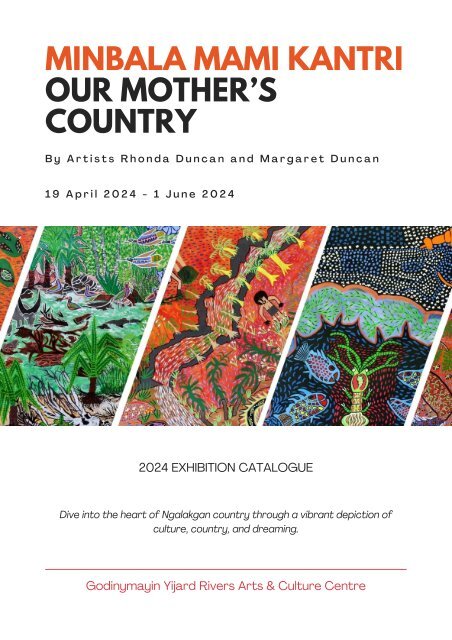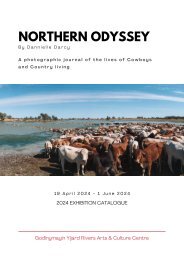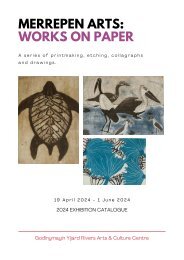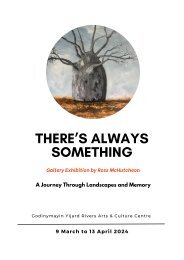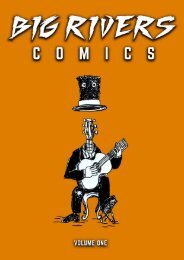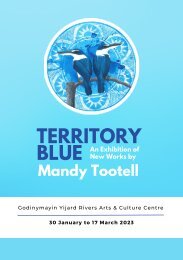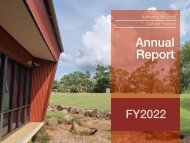Minbala Mami Kantri | Our Mother's Country
An exhibition by Rhonda and Margaret Duncan
An exhibition by Rhonda and Margaret Duncan
You also want an ePaper? Increase the reach of your titles
YUMPU automatically turns print PDFs into web optimized ePapers that Google loves.
MINBALA MAMI KANTRI<br />
OUR MOTHER’S<br />
COUNTRY<br />
B y A r t i s t s R h o n d a D u n c a n a n d M a r g a r e t D u n c a n<br />
1 9 A p r i l 2 0 2 4 - 1 J u n e 2 0 2 4<br />
2024 EXHIBITION CATALOGUE<br />
Dive into the heart of Ngalakgan country through a vibrant depiction of<br />
culture, country, and dreaming.<br />
Godinymayin Yijard Rivers Arts & Culture Centre
T h e A R T I S T S<br />
A B O U T<br />
M a r g a r e t D u n c a n<br />
A B O U T<br />
R h o n d a D u n c a n<br />
Margaret Duncan is a skilled painter,<br />
weaver and carver from Urapunga,<br />
Northern Territory. Margaret’s art<br />
celebrates her connection with <strong>Country</strong>,<br />
culture, story and family. Margaret’s<br />
Aboriginal name is Bongyii, her skin name<br />
is Gamanyjan and her mother’s family is<br />
Millwarparra (kangaroo people)<br />
belonging to the <strong>Country</strong> around<br />
Urapunga, Roper Bar and Ngukurr. Her<br />
father is Ritharrŋu from north-east<br />
Arnhem Land.<br />
Rhonda Duncan is skilled painter, weaver,<br />
and carver from Urapunga, Northern<br />
Territory. Rhonda’s work celebrates the<br />
colour and liveliness of Ngalakgan<br />
<strong>Country</strong> through her vibrant depictions<br />
of birds, waterholes, bushfoods and<br />
seasons. Rhonda’s Aboriginal name is<br />
Brukgin, her skin is Gamanyjan. Rhonda’s<br />
mother is a Millwarparra woman<br />
(kangaroo people) and her language is<br />
Ngalakgan. Her father is Ritharrŋu from<br />
north-east Arnhem Land.
Food Hunting<br />
Rhonda Duncan<br />
Buffalo Crossing<br />
Margaret Duncan
About<br />
Rhonda & Margaret<br />
Duncan and <strong>Minbala</strong><br />
<strong>Mami</strong> <strong>Kantri</strong>.<br />
Urapunga is a small Aboriginal<br />
community nestled between the Roper<br />
and Wilton Rivers, below the southern<br />
border of Arnhem Land in the Northern<br />
Territory.<br />
They love to create pieces that<br />
capture stories of Urapunga<br />
<strong>Country</strong>, place and how people<br />
live.<br />
The Ngalakgan People have lived on and<br />
cared for the area, including Urapunga,<br />
since time immemorial. Their<br />
custodianship is present in the landscape,<br />
in the burial caves and rock art shelters,<br />
the cultivated <strong>Country</strong> and living<br />
descendants spread between Ngukurr,<br />
Urapunga and beyond.<br />
Artists Rhonda Duncan and Margaret<br />
Duncan come from a long lineage of<br />
artists and masters in traditional weaving,<br />
painting, and carving.<br />
They love to create pieces that capture<br />
stories of Urapunga <strong>Country</strong>, places,<br />
animals, culture, family and how people<br />
live on <strong>Country</strong>.<br />
This exhibition is supported by not-forprofit<br />
organisation Circulanation in<br />
partnership with the Urapunga Arts<br />
Aboriginal Corporation. Together their<br />
goal is to create a sustainable art and<br />
cultural enterprise, to share and celebrate<br />
culture, and to provide economic<br />
prosperity for future generations.
AN INTIMATE LOOK<br />
AT THE STORIES<br />
WOVEN WITHIN<br />
THESE PIECES.<br />
An interview with artists<br />
Rhonda Duncan & Margaret Duncan<br />
Rhonda Duncan and Margaret Duncan<br />
hail from a rich lineage of artists and<br />
masters in traditional weaving, painting,<br />
and carving. Their passion lies in crafting<br />
artworks that encapsulate the essence of<br />
Urapunga <strong>Country</strong>. ABC reporter James<br />
Elton sat down with the artists at<br />
Godinyamyin for a conversation about<br />
their inspiration, method, and life.<br />
Q: Can you tell me about when you<br />
were growing up, what do you<br />
remember about when you first learned<br />
to paint?<br />
Margaret: We didn't have any paint and<br />
brush in those days, so our brush were<br />
made from our hair and rocks. We went<br />
down the river and collect all the different<br />
kinds of colours, smash them up and<br />
make it into a paste.<br />
Rhonda: I used to get writing pad and<br />
texta and I used to do drawing, I ended up<br />
doing paintings as well, just learning it till I<br />
get a hold of it. When you see a lot of<br />
beautiful colour during the Dry Season<br />
and Wet Season. That’s where the colour<br />
comes from.<br />
Q: Was telling stories, even from the<br />
dreaming time important in your art?<br />
Margaret: It's all about being out in the<br />
bush. Because that's where in the 60s,<br />
nearly all of the billabongs and waterhole<br />
we used to go hunting with our parents,<br />
were very, very rich and going back I<br />
would like to see the same thing, but I<br />
can't bring it back. We still catch a lot of<br />
fish a lot of Lily roots. We used to walk<br />
and camp in the bush but it's hard to go<br />
out now because we been introduced to<br />
motorcars.<br />
Q: With the richness of the land now<br />
degrading, its almost like your paintings,<br />
are in some ways about grief or loss? .<br />
Margaret: In our heart, how we used to<br />
see it, it just fill our hearts and make you<br />
feel really good inside, it takes away the,<br />
the anger, the things that you stress<br />
about in today's world. It’s like when we<br />
go sitting down the river fishing, you just<br />
sitting there on the sand, relaxing, looking<br />
at the different birds in the waterway. It<br />
makes you feel really good inside. That's<br />
how I see my painting.
Rhonda: When I do my painting, my<br />
painting is all about Mother Nature. Like<br />
growing up through the Dry Season,<br />
different colours changing and during the<br />
Wet Season, the brightness of the plant,<br />
the animals and the water. It makes me<br />
feel relaxed, take out your stress.<br />
Q: What do you think about each other's<br />
art, about the similarities and<br />
differences?<br />
Margaret: Well, for me, we are from the<br />
one mummy and daddy and great<br />
grandmother and grandfather. We grew<br />
up in the same way. We’ve been helping<br />
each other for a long time.<br />
Q: Tell us more about your <strong>Mami</strong>?<br />
Margaret: All this painting that we've<br />
done is about our mami country. And our<br />
grandfather my mami’s father, and then<br />
all of my uncles and all of my cousin. This<br />
is where we live. <strong>Our</strong> mami’s country. The<br />
land that hold us like this, we stay in this<br />
one place.<br />
Rhonda: <strong>Our</strong> painting are about mami.<br />
Motherland and grandpa, that mami’s<br />
uncle and mami’s father that we look<br />
after the country for them.<br />
Q: What would you say to somebody<br />
else who wanted to be an artist and had<br />
this gift to share?<br />
Margaret: You just have to try and try!<br />
When you do a painting and you make a<br />
mistake, like a mistake in everything that<br />
you do you got to keep going, you can't<br />
just stop there. You just gotta focus on<br />
one way and keep going. Don't stop.<br />
Otherwise, you'll be going downhill you<br />
know? We go downhill but we come up<br />
again. It doesn't stop there.<br />
Rhonda: That’s what I was doing, I end up<br />
doing my own painting, and the basket<br />
weaving. So I won my battle, I got the<br />
hang of it now.<br />
Above: Doreen Ponto (<strong>Mami</strong>)<br />
Below: Long Billabong by Rhonda Duncan
G A L L E R Y P i e c e s A r t i s t s R h o n d a D u n c a n<br />
a n d M a r g a r e t D u n c a n<br />
Pieces by Rhonda Duncan:<br />
Rain Falling 150cm x 116cm<br />
The First Coming of the Wet Season 113cm x 232cm<br />
Cherapin Season 114cm x 153cm<br />
Grandparents Looking After <strong>Country</strong> at Roper Bar 134cm x 247cm<br />
Long Billabong 153cm x 250cm<br />
Food Hunting 89cm x 165cm<br />
Vision of Dreams 137x236cm<br />
Dry Season Birds 210x118cm<br />
Bush Food 105x126cm<br />
Lillie Pod, Plate<br />
Bush Tucker, Plate<br />
$3,330<br />
$6,330<br />
$4,170<br />
NFS<br />
$5,000<br />
$3,000<br />
$3,330<br />
$3,330<br />
$4,170<br />
$800<br />
$800<br />
Pieces by Margaret Duncan:<br />
Djawa Spring 104cm x 124cm<br />
Las tu Olman en Olgaman 88cm x 109cm<br />
Bulunbulun 100cm x 129cm<br />
Spring <strong>Kantri</strong> 132cm x 112cm<br />
Buffalo 100cm x 127cm<br />
Warajara 87cm x 110cm<br />
Buffalo Crossing 100cm x 120cm<br />
Two Bala Crab, Plate<br />
Two Bala Yam, Plate<br />
NFS<br />
$5,830<br />
$4,170<br />
$8,330<br />
$5,830<br />
$5,000<br />
$5,830<br />
$800<br />
$800
Godinymayin Yijard Rivers<br />
Arts and Culture Centre<br />
gallery@gyracc.org.au<br />
PO Box 613, Katherine, NT<br />
0850<br />
Godinymayin Yijard Rivers Arts and<br />
Culture Centre was established in 2012 as<br />
the flagship cultural facility for the<br />
Katherine Region, and recently marked<br />
our 10th anniversary as the region’s<br />
gathering place. <strong>Our</strong> founders were a<br />
visionary group of local artists, elders, civic<br />
leaders, business owners, pastoralists,<br />
educators, and government partners who<br />
wanted to make a special place for the<br />
community. And they did.<br />
Over the past decade, Godinymayin has<br />
become a community hub that now<br />
presents theatre, music, cabaret,<br />
exhibitions, lectures, comedy, cinema, and<br />
civic events—and is also home to<br />
workshops, conferences, corporate<br />
functions, and hired activities of every<br />
kind.<br />
<strong>Our</strong> facilities comprise a welcoming lobby,<br />
the Lambert Gallery for visual arts<br />
programming, the K Space Gallery, the<br />
Laneway Gallery, a cafe and retail shop,<br />
and a large multi-function performing arts<br />
venue and meeting space.<br />
This year an expanded Godinymayin will<br />
begin to appear. Thanks to a Northern<br />
Territory Government Arts Trail<br />
investment, we are developing expanded<br />
indoor cultural facilities and a brand new<br />
outdoor amphitheatre and covered deck<br />
cafe area for the region's residents and<br />
visitors to enjoy.<br />
<strong>Our</strong> non-profit organisation is governed<br />
by a board of 12 community leaders—<br />
including representatives from the<br />
Jawoyn, Wardaman and Dagoman people.<br />
We are managed throughout the year by<br />
a small team of dedicated arts<br />
professionals who are passionate about<br />
the the community, cultural identity, and<br />
creative opportunities and celebrations.<br />
We work hard to perpetuate and grow our<br />
founding vision, and ensuring a special<br />
place in Katherine where creativity,<br />
culture, and heritage will always come<br />
together and thrive. We at Godinymayin<br />
are also grateful for the ongoing<br />
partnership and exchanges with the<br />
region’s arts centres, and to our principal<br />
partners the Northern Territory<br />
Government and Katherine Town Council.<br />
In everything, we do, our organisation<br />
acknowledges the Traditional Owners of<br />
the land and region we inhabit—the<br />
Jawoyn, Wardaman and Dagoman people<br />
—and their Elders past, present, and<br />
emerging.<br />
Special Thanks to Godinymayin team for<br />
their dedication and hard work: Caitlin<br />
Backhouse, Jessy Moss, Janet Schultz,<br />
Roxy Collins, Talisha Ellis, Nathan Lennard,<br />
Jules Renner and Brianna Lennard.<br />
With your help and participation, our new<br />
performance venue will bring great<br />
cultural events and dry season<br />
programming—and make a more dynamic<br />
Katherine Region.<br />
.


